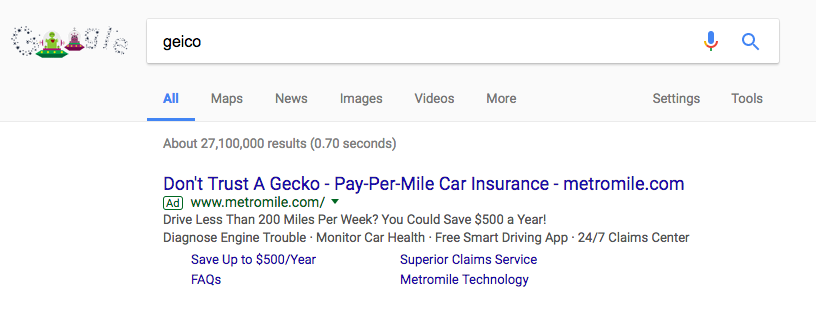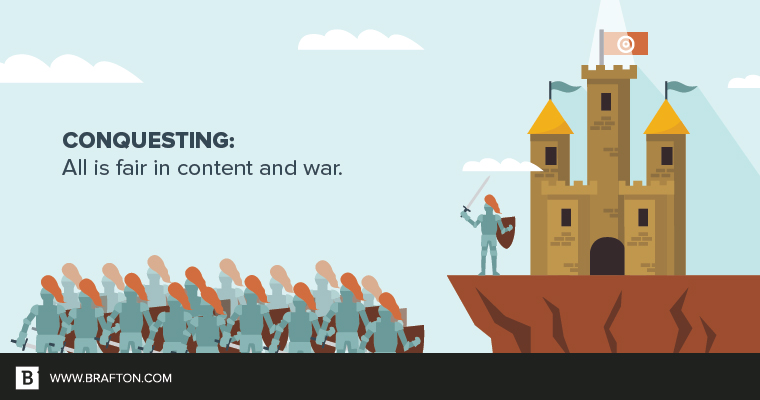All is fair in lovecontent and war. Just ask your competitors.
Conquesting – tactically buying your competitors’ brand names and other relevant branded terms – is really a form of digital trench warfare.
Every dollar spent and every square inch of web terrain captured needs to be properly vetted and measured before, during and after.
What you gain from conquesting is owning your competitors’ paid search terms, driving traffic to your site instead of theirs. But what if they do the same to you?
You could end up sinking more and more money into a campaign of mutually assured destruction – perhaps you survive victorious, but your budget is shot and you’ve got little to show your CEO. You’ll see below why this doesn’t have to happen to you.
The trouble is that marketers either put too much focus on conquesting or do so for the wrong reasons (ego, stakeholder pressure, outdated tactics, etc.). In this sense, yes, conquesting could be a waste of your time, but, in reality, resource efficiency may not have been a part of your original (mis)calculation, which is a separate problem entirely.
Let’s look at how conquesting could and should work.
Does conquesting work?
Few things are as frustrating as putting marketing spend toward paid search ads only to find out another company is already siphoning off traffic on your branded terms and redirecting it to their site (aka, they’re conquesting you).
Even worse, the landing page those misguided visitors land on is likely to feature incorrect and biased information against your brand. A real sucker punch.

Luckily, Google assigns a quality score to every PPC ad you run, meaning you can minimize the impact of competitor conquests against your brand. In short, Google makes it more expensive for businesses to bid on branded keywords that aren’t their own and rewards companies that stick to keywords that are actually relevant to their brand.
By bidding on your own terms, Google grants you a higher quality score because your ad is likely to be highly relevant to the searcher and you already have content on your site that will aid the searcher in his or her quest to learn more about you.
Google also accounts for the expected clickthrough rate of the proposed ad and the user experience on the landing page it directs to. If you want to put in the investment to produce a quality landing page as well as optimize specific ad copy to enhance CTR, then conquesting is a valuable weapon in your arsenal.
Many companies don’t always go this extra mile, however.
Other components of the quality score equation are:
- Landing page load time.
- Ad effectiveness across device type (desktop, mobile, tablet, etc.).
- Geography and relative historical performance.
- Past CTR performance of other ads and keywords associated with Google AdWords account.
- Past performance of display URL.
How do I get the most value out of conquesting?
Conquesting should be considered one small tool in a well-rounded paid search strategy.
The key to making keyword bidding as effective as possible is to be hypertargeted in your ads and to understand the limited but consequential purpose of such a tactic.
As a general rule, conquesting can serve better results if your company is in a niche industry and sells an expensive product or software. The competition for that product – or products like it and their associated keywords – will be lower, assuming your product is at least mainstream enough to trigger an auction.
Moreover, obtaining a single lead from conquesting can prove lucrative, making the investment well worth it.
For example, converting on an ad lead for a $1 million industrial safety product nets you enough profit to justify thousands of dollars in bidding spend.

Conversely, take a common consumer product like a water bottle.
There are thousands of water-bottle sellers throughout the world and most charge a nominal amount of money. The ad space competition is going to be higher, and the potential ROI for a conversion will be smaller, making conquesting a less-profitable tactic.
Appreciating your place in the industry and the likelihood of ROI prior to investing in conquesting cannot be overstated, as bidding on competitor keywords can become expensive very quickly.
To ensure you maximize your chances of success, remember:
Conduct competitive ad analysis
You can’t manage what you can’t measure, as every executive says. Come to the battlefield armed with every keyword your competitors are using, where their weaknesses lie and potential easy search targets for you to vanquish.
There are plenty of tools to lean on (more on that below!).
Know what’s trademarked
The intricacies of advertising law can be tricky, especially when operating globally. If attempting to intrude on a competitor’s turf using one of their branded terms, ensure that word or phrase isn’t already trademarked – your bidding platform should be able to flag these instances, as well as other legal issues that may arise.
Produce landing pages that enhance your bid
Your landing pages are the backbone of your conquesting game plan, and you’re not able to run search ads until your landing pages are completed – so make them great! Optimizing them using the below tactics can ensure you obtain better quality scores and that you’re not inadvertently driving up your CPC.
Implement CRO best practices
The point of generating any lead is to have the user convert. Experiment with different colors, typography, page layout, verbiage and CTA placement to determine which combination of on-page factors will produce higher conversions. (Click here to learn CRO secrets.)
Use captivating ad copy
Without the right copy on your paid ads, your investment won’t do much. Your ad copy should be enticing and relevant to the search. Take stock of how competitors are framing their ads and adjust yours as necessary to make yours more convincing to click on.
Think like a searcher with your keywords
Getting inside the mind of a searcher is every marketer’s goal. Many users don’t search solely for “Nike shoes” or “new Nike shoes”: They also enter queries that tip you off to their intent, such as, “Nike shoes comparison” or “Nike rewards.”
Common terms you can leverage to your advantage are:
- Cancel (“how to cancel Nike order”).
- Return (“how to return shoes Nike”).
- Reviews (“Nike shoes reviews”).
- Any misspellings (“Nik” or “Nike basketbal shoes,” for instance).
- Longer-tail phrases (“Where to buy Nike shoes online” or “New Nike shoes 2018”).
These phrases show search intent, which clues you in on how to frame your ads and capitalize on bidding opportunities that your competitors may not want to pay for.
Keyword tools to make my conquest easier
To come to the fight fully loaded, you’ll need data in your corner – yours and your competitors’.
Veteran paid search analysts trained in the hand-to-hand combat of competitive keyword bidding swear by the following tools:
- SEMrush: Uncover the history of competitive ad performance and estimated CPC.
- SpyFu: Download every keyword your competitors have bought in the last 11 years.
- Google Trends: Determine when searches occur and how to time ads for max CTR.
- Searchmetrics: Understand CPC, search volume and PPC opportunities.
Being familiar with Google AdWords and Bing Ads is the foundation of any paid search strategy, so ensure you have an expert PPC vendor to do the dirty work for you.

Further, it’s important to note that conquesting is primarily useful in stealing traffic and increasing brand visibility.
Even if you’re not gaining the clicks you’d like, the act of placing your ads in front of searchers can still produce intangible benefits down the road through continuous impressions. Searchers will inevitably begin to recognize your ads and make their own mental connections – if your ads are relevant and serve users’ intent, you’re on the right track toward ROI.
Lastly, all costs associated with conquesting are relative to the larger keyword strategy, meaning if your comprehensive PPC model is shoddily built, it will be difficult to determine the next steps of your bidding campaign.
So the question shouldn’t necessarily be, “Is conquesting a waste of my time?” but rather, “Is my PPC strategy designed to unlock the potential benefits of conquesting?”
Well…is it?





